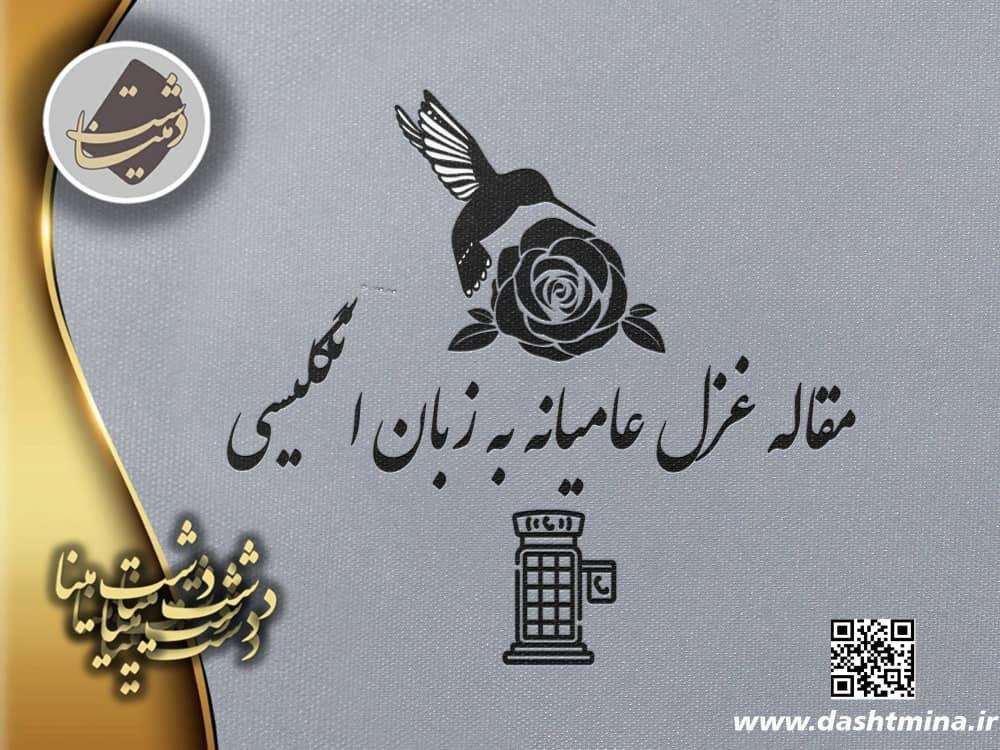مقاله غزل عامیانه در زبان فارسی به زبان انگلیسی
Folk poems and lyrical poems in Iranian literature
Iranian literature is mixed with rich poems in various styles. Iranian poets have been the greatest literary innovators in the world. From Saadi and Hafez to Attar and Khayyam, Rumi and Babataher have each breathed a new spirit into the body of Persian poetry with a unique style. The result of the tireless efforts of these icons is the birth of various styles in the poems of the people of Persia. One of the most aesthetic and romantic poetic styles is the sonnet. If you are interested in sonnet poetry, we suggest that you read the collection of folk poems and sonnet poems of Dasht-e Mina composed by Haidar Ali Jamshidi and experience the style of folk sonnet poems that have many fans among the enthusiasts of popular culture.
What is a Sonnet?
If you want to get familiar with sonnet poetry, it is better to open the divan of Hafez for classical sonnet poetry and be surprised by its depth and genius. It is very difficult to say about Hafez and Hafez’s sonnets, which is not the scope of this article. Along with all the great Persian sonnet poets and unique styles of sonnets, there is also a type of sonnet called folk sonnet, which is considered a branch of folk culture and literature. We can give an example of a unique collection, the collection of folk poems and sonnets of Dasht-e Mina is one of the most unique poetic works in the style of folk sonnets in terms of the count of sonnets and the thematic variety of sonnets. But in general, it is better to know that the definition of sonnet is a short poem with four to twelve verses. The main theme of sonnet in Persian literature is the expression of emotions and feelings, showing the enchantment and beauty of the beloved and the glory of the times. Persian sonnet obtains independence and strength. The name of the creator of the sonnet usually appears in the last two verses. The people of Persia have titled the most beautiful verse of the sonnet “Shah Beit”(king verse).
A brief research on the evolution of sonnet in Persian literature
If we want to have a brief research on the evolution of sonnets in Persian literature, it can be said that Anvari gave life to the romantic sonnet. Saadi put integrity on the face of this sonnet. The undisputed creator of mystical sonnet is Sanai Ghaznavi. The seed of mystical sonnets grew in the arms of great people such as Attar Neyshabouri, Rumi Balkhi, and Fakhreddin Iraqi. The peak of mystical sonnet poetry can be found in the poems of Maulana Jalal Din Balkhi. It should also be noted that Sir Hafez is the best lyricist in sonnet poetry.
In the meantime, one cannot ignore the folk poems of the people that have been narrated heart to heart. Folk poetry is the oral culture or folk literature of the people. Who have put their feelings, experiences and moral principles in the body of poems, so that it is sweet as honey, pleasant as the sound of birds and therefor it will be remembered. In other words, folk poetry is the subcultures, beliefs, longings and aspirations of the masses that have been revived among those words. What makes folk poems pleasant is the closeness of these poems to the culture of the people around us. Communication with these easy poems and understanding of the content is easily done by even the general public.
Getting fully acquainted with folk sonnet poems
In the meantime, the sonnet also experienced a new style and penetrated among the people under the name of folk sonnets. Folk sonnet poems are the result of sincere and fearless romances. Its language is fluent, knowledgeable and pure. In this sonnet, the content is not inexpressive, it is not lost in between heavy words.
This is a straightforward sonnet. It expresses its meaning recklessly, therefor Folk sonnets are not considerable it Seeks to create controversy. Which is less seen in traditional sonnets. Sometimes it is humorous and it makes you laugh and sometimes it is bitter and it makes you cry. Sometimes it makes you think, sometimes it reminds you, and sometimes it looks at things from a new perspective.
In the meantime, the folk sonnets of Haidar Ali Jamshidi shine like a jewel. Jamshidi writes recklessly. It says what it should be. The tone of his poetry is intimate but the subject of the poem is serious. The paradox of the sonnets from Jamshidi is to portray the most serious issues with friendly and familiar expressions. In his folk sonnets, important topics such as mother and heaven, prayer and teacher are evident. How beautiful is the interpretation of that paradise is under the feet of mothers and the collection of folk poems and sonnets from Dasht-e Mina can be seen in this verse.
Never say heaven is under the step of mothers
Because the key to Paradise is the mother’s prayer
What screams out in Jamshidi’s sonnets is the clever allusions to popular and traditional proverbs and expressions.
The verse
Yusuf the lost, let me give you of which you are worth
At last my heart listened to the sound of your voice
How subtle is the reference to the poem (Yousef the lost, will return to Canaan, don’t mourn… your home of sorrow will one day turn in to rosary, and so don’t mourn)
Jamshidi’s obligation with the sonnet is clear. He understands this style of poetry and his poems pierce into many works such as the collection of poems and folk sonnets of Dasht-e Mina.





